One of the great joys of reviewing movies is the opportunity to attend film festivals. They offer moviegoers a chance to see multiple offerings in myriad genres from countries all over the globe, featuring everything from little-known independent productions to Hollywood blockbusters. And so it is with my hometown event, the Chicago International Film Festival, which just recently completed its 55th edition.
The Chicago festival just keeps getting better and better every year. I’ve attended many of the festivals over the past 40 years (I started attending when I was 2…), and I’ve seen vast improvements in programming and staging in that time, efforts that have truly made this a world class event. Over 12 days, I screened 15 films, many of which were good to excellent.
With that in mind, I offer my thoughts and impressions on the pictures I saw. My scores, which are based on the 1-5 rating scale used by festival attendees, appear at the end of each of my evaluations. Lengthier reviews of some of these releases will be featured in future blog entries.
So sit back, relax and enjoy my journey through an inspired field of movies. And, if you should ever attend this event in the future, be sure to look for me on the red carpet. I’ll be there!
[caption id="attachment_11048" align="alignnone" width="222"]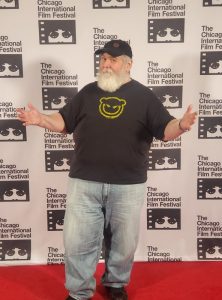 Photo by Trevor Laster.[/caption]
Photo by Trevor Laster.[/caption]
“Babyteeth” (Australia)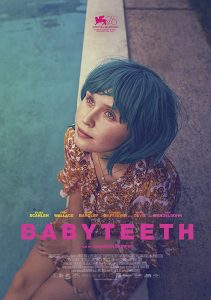
The seemingly unlikely romance between a seriously ill teenager (Eliza Scanlen) and a junkie/small-time drug dealer (Toby Wallace) outrages her parents (Ben Mendelsohn, Essie Davis), despite the fact that mom and dad each engage in their own bad behavior and have more than their own share of issues. Yet, as this story plays out, it becomes apparent that those who are supposed to provide guidance can learn much from those they’re guiding.
With a tautly written script, a superb ensemble cast (especially Mendelsohn in one of his best performances), creative cinematography and a more than ample supply of quirky humor, this excellent debut feature from director Shannon Murphy ushers the audience through a minefield of emotions (especially in the film’s concluding sequence), leaving viewers moved – and drained – by picture’s end. Think of this as a slightly off-the-wall, bittersweet and decidedly more dysfunctional version of “Terms of Endearment” (1983), and you have the idea. A superb offering from a promising new talent. Don’t miss it. (5/5)
[caption id="attachment_11050" align="alignnone" width="350"] A seriously ill teenager (Eliza Scanlen) ponders an uncertain future in director Shannon Murphy’s debut feature, “Babyteeth.”[/caption]
A seriously ill teenager (Eliza Scanlen) ponders an uncertain future in director Shannon Murphy’s debut feature, “Babyteeth.”[/caption]
“Ordinary Love” (UK)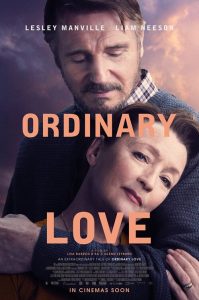
This sensitive, highly personal look at what a breast cancer diagnosis does to longtime happily married couple (Lesley Manville, Liam Neeson) evokes heartfelt emotions as the story wends its way through the ups and downs of coping with illness and an uncertain future. And, coming in the wake of the tragic and unexpected death of their only child, this latest burden is made all the more difficult for a wife and mother facing her own mortality and a husband and father staring down the prospect of being alone.
Directors Lisa Barros D’sa and Glenn Leyburn draw excellent award-worthy performances out of their two protagonists (especially Manville), presenting the audience with a couple who exude a comfortable familiarity at both their best and worst. The picture’s simple but effective cinematography and suitably fitting soundtrack greatly enhance the mood of the story, taking a subject that’s been addressed on film before and elevating it to an entirely new level of candor and viewer intimacy. A moving, exceedingly touching experience to be sure. (5/5)
[caption id="attachment_11052" align="alignnone" width="350"] A breast cancer patient (Lesley Manville, right) and her concerned husband (Liam Neeson, left) struggle to cope with the changes to their long-tenured relationship in “Ordinary Love.”[/caption]
A breast cancer patient (Lesley Manville, right) and her concerned husband (Liam Neeson, left) struggle to cope with the changes to their long-tenured relationship in “Ordinary Love.”[/caption]
“Spider” (“Araña”) (Chile)
When a believed-dead right-wing Chilean nationalist (Marcelo Alonso) reappears decades after working with the radical Fatherland and Liberty movement to overthrow the Communist government of President Salvadore Allende, old ghosts from the past re-emerge from the woodwork, circumstances that create havoc for the story’s principals both personally and publicly. Told through a series of flashbacks seamlessly woven into the present-day narrative, the film reveals a complex political struggle that spills over from the day’s public events and into the personal lives of the movement’s participants (and vice versa), both in the past and the present.
Director Andrés Wood delivers an engaging, edge-of-your-seat thriller with both personal and public implications, as well as a message that’s just as important for today as it was in the past, and not just in Chile. “Spider,” a nominee for the festival’s Gold Hugo Award, the event’s highest honor, is yet another excellent example of the work coming out of one of the world’s foremost emerging film industries. (5/5)
[caption id="attachment_11054" align="alignnone" width="350"] Right-wing radicals (Maria Valverde, left, and Gabriel Urzúa, right) work on planning strategies to overthrow Chile’s leftist leadership in the early 1970s in director Andrés Wood’s Gold Hugo-nominated offering, “Spider” (“Araña”).[/caption]
Right-wing radicals (Maria Valverde, left, and Gabriel Urzúa, right) work on planning strategies to overthrow Chile’s leftist leadership in the early 1970s in director Andrés Wood’s Gold Hugo-nominated offering, “Spider” (“Araña”).[/caption]
“Balloon” (“Qi Qui”) (China)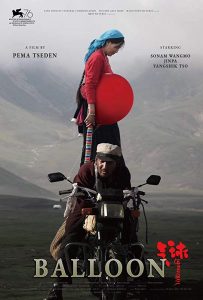
This paradoxical fable explores what happens when long-cherished spiritual beliefs collide with sociopolitical public policy in Tibet during the days of China’s one-child birth policy. To say more would reveal too much, but suffice it to say that the picture weaves a lush tapestry of thoughts and feelings that grows ever-more captivating the further one gets into its narrative.
Poetically told by director Pema Tseden, with inventive and often-breathtaking cinematography, an elegant soundtrack, gentle humor and an ethereal storytelling approach, this simple but stirring tale moves viewers in heartfelt ways at both ends of the emotional scale. While the pacing of this Gold Hugo nominee and best screenplay winner is a tad sluggish in the middle, that’s easily overlooked in light of everything else this excellent release has to offer. (5/5)
[caption id="attachment_11056" align="alignnone" width="350"] The clash of traditional spirituality and modern government policy affect three generations of a Tibetan family in director Pema Tseden’s “Balloon” (“Qi Qui”).[/caption]
The clash of traditional spirituality and modern government policy affect three generations of a Tibetan family in director Pema Tseden’s “Balloon” (“Qi Qui”).[/caption]
“The Father” (“Bashtata”) (Bulgaria/Greece)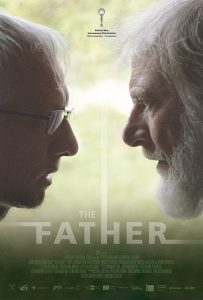
This touching charmer examines how a father (Ivan Savov) and son (Ivan Barnev) deal with the loss of their wife and mother (Maria Bakalova) while simultaneously sorting out long-simmering differences between them. But such serious matters get tabled when dad is convinced that his beloved is trying to communicate with him from the other side and seeks the aid of a shady mystic to learn what messages mom has for him, much to the consternation of his pragmatic son, who’s further burdened by challenges at work and the many moods of a sensitive pregnant wife (Margita Gosheva).
The result is a zany saga that combines both hilarious and meaningful moments filled with heartfelt emotion and more than a few startling synchronicities, all in an unlikely road trip/buddy film format. The picture’s deft fusion of comedy and drama weaves a captivating tale, one with both raw emotion and ample laugh-out-loud humor. A truly unexpected gem from the husband and wife directorial team of Kristina Grozeva and Petar Valchanov. (5/5)
[caption id="attachment_11058" align="alignnone" width="350"] A put-upon son (Ivan Barnev, left) attempting to help his out-of-control father on a zany road trip ends up in an array of wacky situations, such as being forced to hitchhike in a hearse, in the hilarious buddy film, “The Father” (“Bashtata”).[/caption]
A put-upon son (Ivan Barnev, left) attempting to help his out-of-control father on a zany road trip ends up in an array of wacky situations, such as being forced to hitchhike in a hearse, in the hilarious buddy film, “The Father” (“Bashtata”).[/caption]
“The Truth” (“Le verità”) (France/Japan)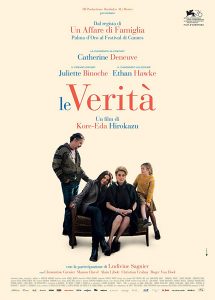
Director Hirokazu Kore-eda’s first foray into filmmaking outside Japan tells the story of an aging actress (Catherine Deneuve) who’s coming to grips with her life in the wake of writing her memoir, one that her daughter (Juliette Binoche) claims is full of oversights, exaggerations and lies. As they match wits in what has been a life-long struggle, the grand dame of French cinema takes on a new movie role in which she plays a character not unlike her daughter, giving her an opportunity to see things from a different perspective. Meanwhile, daughter dearest also discovers that her memory may be fallible and that her recollections of a rotten childhood may not be as accurate as she has long thought.
Deneuve gives a command performance, award-worthy for sure, and the script is full of ample, laugh-out-loud wit. The fine ensemble cast, featuring Binoche and Ethan Hawke, among others, provides excellent support for the film’s leading lady, serving as an excellent “audience” for her latest “performance.” Admittedly, the pacing in the final act could use some shoring up, but this otherwise-delightful offering is well worth the time. (4/5)
[caption id="attachment_11060" align="alignnone" width="350"] An aging actress (Catherine Deneuve, second from right) is forced to come to terms with her daughter (Juliette Binoche, second from left), along with her son-in-law (Ethan Hawke, left) and granddaughter (Clémentine Grenier, right), in director Hirokazu Kore-eda’s “The Truth” (“Le verità”),[/caption]
An aging actress (Catherine Deneuve, second from right) is forced to come to terms with her daughter (Juliette Binoche, second from left), along with her son-in-law (Ethan Hawke, left) and granddaughter (Clémentine Grenier, right), in director Hirokazu Kore-eda’s “The Truth” (“Le verità”),[/caption]
“The Fever” (“A Febre”) (Brazil/France/Germany)
This richly metaphorical clash-of-cultures offering tells the story of an indigenous Brazilian security guard (Regis Myrupu) who leaves his village to work in the industrial port city of Manaus, where he becomes afflicted with a mysterious fever. In searching for the cause of his ailment, the protagonist scours myriad aspects of his life to figure out how to get well, a quest that symbolically reflects wider issues not only for himself, but also for the different peoples of an entire nation.
Filmmaker Maya Da-Rin, winner of the festival’s award for best director, presents an almost-poetic tale of the mystical and material. The film’s deliberately slow pacing (appropriate given the nature of the picture’s subject matter) can be a tad trying at times, but, if viewers can overlook this aspect, they’ll be treated to a moving and thought-provoking story brought to life by a fine ensemble cast of native, non-professional actors. A deceptively affecting offering and worthy Gold Hugo nominee. (4/5)
[caption id="attachment_11061" align="alignnone" width="350"] An indigenous Brazilian security guard (Regis Myrupu, right) seeks to discover the source of a mysterious illness in “The Fever” (“A Febre”), festival winner for best director Maya Da-Rin.[/caption]
An indigenous Brazilian security guard (Regis Myrupu, right) seeks to discover the source of a mysterious illness in “The Fever” (“A Febre”), festival winner for best director Maya Da-Rin.[/caption]
“Deerskin” (“Le daim”) (France)
Arguably the funniest one-joke movie I’ve ever seen, this absurd dark comedy from director Quentin Dupieux follows the strange exploits of a budding serial murderer (Jean Dujardin) who becomes obsessed with a newly acquired second-hand deerskin jacket that gives him a “killer” appearance. When the jacket begins “speaking” to him, however, things go from weird to truly bizarre, especially when it tells him that it wants to be the only jacket in the world, prompting its owner to look for ways to eliminate all of its competition – and at any cost.
This macabre offering is definitely not for everyone. Some of the violence may be a bit much for sensitive viewers, and the story could be just too strange for those who like their cinema a bit more conventional. But for those with off-the-wall tastes who like their horror films with a humorous edge, this one will definitely suit you. (4/5)
[caption id="attachment_11063" align="alignnone" width="350"] A budding serial killer (Jean Dujardin) starts slipping over the edge when he begins having bizarre conversations with his jacket as seen in the edgy, off-the-wall dark comedy, “Deerskin” (“Le daim”).[/caption]
A budding serial killer (Jean Dujardin) starts slipping over the edge when he begins having bizarre conversations with his jacket as seen in the edgy, off-the-wall dark comedy, “Deerskin” (“Le daim”).[/caption]
“The Whistlers” (“La Gomera”) (Romania/France/Germany)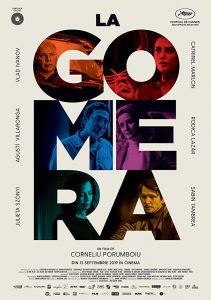
This stylish, clever crime caper features an intriguing game of cat and mouse involving crooked Romanian detectives, ruthless Spanish gangsters, a pious Eastern Orthodox matriarch and a system of communications employing an ancient whistling language created in the Canary Islands. It’s a tale that combines its diverse elements to keep viewers guessing right up to the end.
Drawing upon dry humor, an operatic soundtrack and a series of stunning revelations, this Palme d’Or nominee from this year’s Cannes Film Festival takes viewers across three continents in a race aimed at trying to figure out who’s trying to outdo who (and why). While the narrative occasionally gets a little too convoluted for its own good, director Corneliu Porumboiu’s latest is otherwise a sinister but fun, visually dazzling romp. (4/5)
[caption id="attachment_11065" align="alignnone" width="350"] Crooked Romanian detectives, ruthless Spanish gangsters and a strange whistling language invented in the Canary Islands all combine for a clever, stylish crime drama in “The Whistlers” (“La Gomera”).[/caption]
Crooked Romanian detectives, ruthless Spanish gangsters and a strange whistling language invented in the Canary Islands all combine for a clever, stylish crime drama in “The Whistlers” (“La Gomera”).[/caption]
“The Wild Goose Lake” (“Nan Fang Che Zhan De Ju Hui”) (China/France)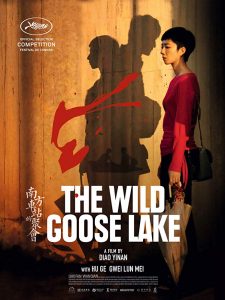
This sometimes-campy, sometimes-intense, often-quirky crime drama about a motorcycle thief (Ge Hu) on the run from authorities and rival thugs features an eclectic mix of elements and influences ranging from contemporary Chinese cinema to French crime dramas to martial arts movies and even a pinch of Quentin Tarantino Lite. The picture’s “I-can’t-believe-they-just-did-that” humor adds spice and diversion, keeping the story lively, fresh and entertaining.
However, while the first half sails along well, the back end tends to meander somewhat, dragging out the story toward an ending that’s more than a little predictable. With better editing and a tighter script, especially in the concluding sequences, director Yi’nan Diao’s Palme d’Or nominee could have been a knock-out, but, unfortunately, it limps across the finish line instead of racing past it. (3/5)
[caption id="attachment_11067" align="alignnone" width="300"] A motorcycle thief (Ge Hu) on the run from authorities and rival thugs provides the narrative for the sometimes-campy, sometimes-intense crime drama, “The Wild Goose Lake” (“Nan Fang Che Zhan De Ju Hui”).[/caption]
A motorcycle thief (Ge Hu) on the run from authorities and rival thugs provides the narrative for the sometimes-campy, sometimes-intense crime drama, “The Wild Goose Lake” (“Nan Fang Che Zhan De Ju Hui”).[/caption]
“Corpus Christi” (Poland/France)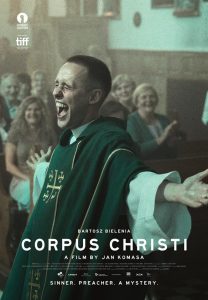
When a paroled juvenile inmate (Bartosz Bielenia) who desires to become a priest gets an opportunity to assume the identity of one without seminary training, he jumps at the chance, an act that allows him to see how well he’s able to follow a calling that has been detoured by his past. It’s a challenging undertaking that finds him constantly under the microscope as he’s pursued by ghosts of his prison days and scrutinized by parishioners who question his unconventional style of ministering.
However, while director Jan Komasa’s Gold Hugo nominee has its moments – most notably Bielenia’s stellar turn in the festival’s best actor performance – the overall package tries to incorporate too many plot lines and cover far too much ground, leaving certain important aspects (especially the protagonist’s motivations and back story) underdeveloped. A pared-down treatment would have benefitted this noble attempt nicely, making for a more focused and meaningful offering. (3/5)
[caption id="attachment_11069" align="alignnone" width="350"] A paroled juvenile offender who longs to be a priest (Bartosz Bielenia) gets an opportunity to explore his calling in director Jan Komasa’s “Corpus Christi.”[/caption]
A paroled juvenile offender who longs to be a priest (Bartosz Bielenia) gets an opportunity to explore his calling in director Jan Komasa’s “Corpus Christi.”[/caption]
“Mr. Jones” (Poland/UK/Ukraine)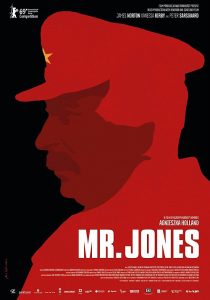
This fact-based biopic chronicles the efforts of British diplomat-turned-reporter Gareth Jones (James Norton) in attempting to expose Soviet dictator Josef Stalin’s genocide of Ukrainians in the years prior to World War II, an initiative that met with severe and surprising (and self-serving) opposition in Western diplomatic and journalistic circles. However, his intrepid efforts eventually brought to light a tragedy driven by opportunism and greed, both by its architect and those who benefitted by complicitly looking the other way.
Jones’s saga is a little-known story that screams qualities like “urgency” and “outrage,” traits that, unfortunately, don’t come across nearly as strongly in the film as they should have. Director Agnieszka Holland tends to understate the nature of the narrative, never quite raising it to the level of shock and engagement that the subject matter deserves, frequently muddling the flow of the story with extraneous, if not irrelevant, subplots. Think of this one as a compelling story with regrettably less-than-compelling treatment. (3/5)
[caption id="attachment_11071" align="alignnone" width="350"] The fact-based story of diplomat-turned-journalist Gareth Jones (James Norton) and his efforts to expose Josef Stalin’s genocide of Ukrainians in the years before World War II provides the story line for director Agnieszka Holland’s latest release, “Mr. Jones.”[/caption]
The fact-based story of diplomat-turned-journalist Gareth Jones (James Norton) and his efforts to expose Josef Stalin’s genocide of Ukrainians in the years before World War II provides the story line for director Agnieszka Holland’s latest release, “Mr. Jones.”[/caption]
“Jesus Shows You the Way to the Highway” (Spain/Estonia/Ethiopia/Latvia/Romania)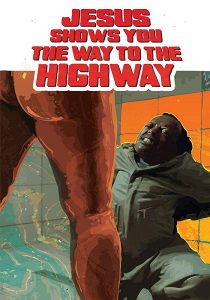
Devotees of the weird will appreciate this uniquely and utterly strange offering about a pair of CIA agents (Daniel Tadesse, Augustín Mateo) sent into cyberspace to destroy a computer virus, only to find that the truth is even more bizarre than thought. The result is one of the most inventive and outrageous films imaginable, easily leaving one’s mouth agape and head suitably scratched.
Through a mix of inventive animation, various photographic techniques and off-the-wall humor, director Miguel Llansó takes viewers on a wild, wild ride through a story that ultimately makes little sense but that generally entertains in its own special way. The picture has a tendency to get a little too wrapped up in its own quirkiness at times, coming across like “The Hitchhiker’s Guide to the Galaxy” (2005) or an episode of “Dr. Who” on steroids. But, if you can overlook that, you’ll get a lot of hearty laughs out of this one. (3/5)
[caption id="attachment_11073" align="alignnone" width="350"] Two CIA agents sent into cyberspace to destroy a computer vice have an unexpected encounter with “Jesus” (Guillermo Llansó, center) in the wacky comedy, “Jesus Shows You the Way to the Highway.”[/caption]
Two CIA agents sent into cyberspace to destroy a computer vice have an unexpected encounter with “Jesus” (Guillermo Llansó, center) in the wacky comedy, “Jesus Shows You the Way to the Highway.”[/caption]
“Atlantics” (“Atlantique”) (France/Senegal/Belgium)
Despite an award-winning pedigree, this mystical Senegalese romance/ghost story never quite gels into a cohesive (and, at times, understandable) whole. While the emotions seem sincere enough and the lyrical cinematography is beautiful to look at, the muddled plot of director Mati Diop’s debut feature is often befuddling as it attempts to blend unrequited love, social commentary and otherworldly elements into a single narrative.
Many of those attending my screening stepped away from it noticeably scratching their heads. Perhaps something was lost in translation. Perhaps the subtlety is a little too understated for its own good. Or perhaps the story was reaching for something it couldn’t adequately capture. In any event, this missed cinematic opportunity is an easily overlooked offering. (2/5)
[caption id="attachment_11075" align="alignnone" width="350"] Ada (Marne Bineta Sane), a bride-to-be promised to a man she doesn’t love, longs to pursue the romance of her choice, a quest shrouded in mystical influences in director Mati Diop’s debut feature, “Atlantics” (“Atlantique”).[/caption]
Ada (Marne Bineta Sane), a bride-to-be promised to a man she doesn’t love, longs to pursue the romance of her choice, a quest shrouded in mystical influences in director Mati Diop’s debut feature, “Atlantics” (“Atlantique”).[/caption]
“Fire Will Come” (“O que arde”) (Spain/France/Luxembourg)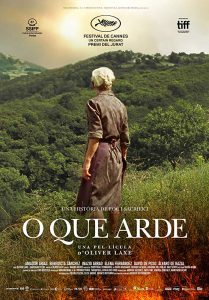
Gorgeous cinematography aside, this leaden-paced tale of a convicted arsonist (Amador Arias) who’s paroled from prison and returns to his rural Spanish homeland where a mysterious new forest fire breaks out struggles to find a story amidst its meandering narrative. Stunning landscape shots and extensive spans of silence (a contributing element to the picture’s award-winning sound design) may be aesthetically appealing, but they dominate to the point of deterring the film’s telling of an engaging and coherent story.
While director Oliver Laxe tries to use this film to make an environmental statement (albeit not all that effectively), it’s not enough to save this otherwise-woefully underdeveloped Gold Hugo nominee, despite its accolades, including a win and a nomination in the Un Certain Regard competition at this year’s Cannes Film Festival. Skip this one, and you won’t miss much. (1/5)
[caption id="attachment_11077" align="alignnone" width="350"] A mysterious forest fire believed set by a paroled arsonist sets the stage for the story in director Oliver Laxe’s award-winning “Fire Will Come” (“O que arde”).[/caption]
A mysterious forest fire believed set by a paroled arsonist sets the stage for the story in director Oliver Laxe’s award-winning “Fire Will Come” (“O que arde”).[/caption]
Copyright © 2019, by Brent Marchant. All rights reserved.
Tuesday, October 29, 2019
Wrapping up the Chicago Film Festival
Monday, October 28, 2019
Tune in for Movies with Meaning

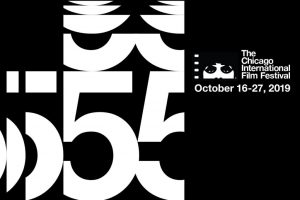

Tuesday, October 15, 2019
An Apology
My apologies to those who were expecting to hear today's Mission Unstoppable interview with filmmaker Assia Boundaoui about her new film, "The Feeling of Being Watched." Due to an unexpected scheduling conflict, show host Frankie Picasso and yours truly were unable to bring this important broadcast to listeners today. We hope to reschedule for a new date in the future. Please stay tuned for details.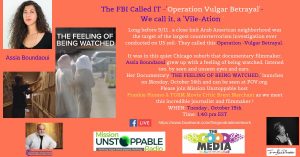


Check out The Cinema Scribe


Monday, October 14, 2019
Tune in for Mission Unstoppable
Those who naively cling to the idea that government abuses of power, particularly when it comes to racial, social or ethnic profiling, can’t happen here need to rethink those notions. To find out more, tune in for a special edition of Mission Unstoppable on Tuesday October 15 at 1:40 pm ET, when host Frankie Picasso and yours truly will interview journalist and filmmaker Assia Boundaoui about her stunning new production, “The Feeling of Being Watched.” The film, which has been playing in limited theatrical engagements and in special screenings at film festivals and community centers, will air Monday October 14 on the PBS series POV and will thereafter be available for streaming on the POV web site. For more about the film, click here.
For the video version of the broadcast, tune in to Facebook Live at 1:40 pm ET by clicking here. And, for the audio-only version, available after the live broadcast, visit the Mission Unstoppable page on The Good Media Network web site by clicking here. Don’t miss this informative and provocative interview about what went on and what we can do to fight back.

Sunday, October 13, 2019
This Week in Movies with Meaning


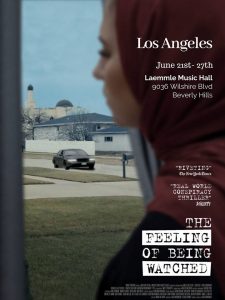



Friday, October 11, 2019
‘Joker’ gives us much to contemplate
“Joker” (2019). Cast: Joaquin Phoenix, Robert De Niro, Frances Conroy, Zazie Beetz, Brett Cullen, Shea Whigham, Bill Camp, Glenn Fleshler, Leigh Gill, Josh Pais, Douglas Hodge, Dante Pereira-Olson, Carrie Lauren Putrello, Sharon Washington, Hannah Gross, Brian Tyree Henry, Frank Wood, Carl Lundstedt, Michael Benz, Ben Warheit. Director: Todd Phillips. Screenplay: Todd Phillips and Scott Silver. Web site. Trailer.
It’s a rare feat when a film covers so much ground that it gives us a lot to take in and assess. In doing so, such stories may well make us feel more than a little uncomfortable (and rightfully so) as they prompt us to take a hard look at what we’re experiencing and how it came about. They may even push us toward taking action at changing what’s going on, even if they make us squirm a bit as we move toward such a decision. So it is with the controversial new fantasy tale, “Joker.”
Arthur Fleck (Joaquin Phoenix) has his share of issues. The psychologically challenged Gotham City resident struggles to hold it together with the aid of a cocktail of prescription meds and the regular, but largely indifferent, counseling of a public aid social worker (Sharon Washington). He ekes out a living as a special event clown, working jobs like retail clearance sales and visits to pediatric hospitals, where he shows off his distinctive cackle and fancy footwork. And, when he’s not engaged with the foregoing, he spends his time caring for his aging live-in mother, Penny (Frances Conroy), who has mental and physical challenges of her own.
For all intents and purposes, Arthur leads a pretty bleak existence. He and Penny live in a rundown apartment building in a marginal neighborhood, one that epitomizes everything that’s wrong with Gotham City. But, if that weren’t enough, Arthur is repeatedly harassed by strangers who assault him or steal his property, particularly when he’s dressed up in his clown outfit. He attempts to fight back, but he’s often hassled by packs of thugs, making it difficult to defend himself. It’s a wonder how he’s able to cope.
However, despite all these travails, Arthur manages to hold out hope for a better life. Having long been told by his mother that his purpose in life was to spread joy to others, Arthur aspires to become a stand-up comedian, perhaps even getting booked on a late night TV talk show hosted by an entertainer he greatly admires, Murray Franklin (Robert De Niro). And the first step toward that goal comes when Arthur gets a chance to try out his act at a local comedy club. Things could be looking up.
What’s more, Arthur has hopes for becoming involved in a meaningful relationship. He’s particularly attracted to his neighbor, Sophie Dumond (Zazie Beetz), a young single mother who seems to be on the same wavelength as him. And, when he believes she’s showing him some interest, he’s even more enthused.
But no sooner do Arthur’s hopes get raised when reality comes crashing down. He’s left to contend with the ongoing difficulties of his circumstances, as well as those of his mother, who often slips into bouts of delusion. For instance, she’s perplexed that she doesn’t receive responses to the many requests for help that she sends to Thomas Wayne (Brett Cullen), one of Gotham’s wealthiest residents and a recently announced mayoral candidate for whom she once worked. Arthur tries to explain to her that it’s unlikely she’ll hear from him, given that Mr. Wayne employed her only briefly many years ago and that he probably doesn’t remember her, despite the fervent hope she’ll hear from him. It’s truly sad.
Just when it seems things couldn’t get any worse, though, circumstances deteriorate even further. Arthur learns that his public aid support is being cut. Then he loses his job and suffers another attack while on his way home, this time at the hands of a trio of obnoxious Wall Street types (Carl Lundstedt, Michael Benz, Ben Warheit) with tragic consequences. He then learns a shocking secret that his mother has been harboring, a revelation that immediately precedes her hospitalization for a stroke. And, to top it off, he sees video footage of his comedy club performance on Murray’s show, presented in an insensitive and unflattering light.
In the meantime, conditions in Gotham begin spiraling out of control, especially where unchecked street crime and the increasingly inflammatory mayoral race is concerned. Criticism against candidate Wayne is running hot and heavy, especially in connection with comments he’s made about Gotham residents disdainful of the city’s wealthy elite. Having referred to these oppressed, largely working class individuals as “clowns,” Wayne’s detractors respond by embracing the derogatory label plastered on them. Masses of citizens wearing clown masks and outfits mobilize to protest the disempowerment and injustice they feel, spreading chaos far and wide.
By this point, Arthur is at wit’s end. He’s had as much as he can handle. He decides that it’s time to retaliate, especially now that he has a pair of detectives (Shea Whigham, Bill Camp) following him, too. And, with conditions being what they are, he’s inspired to take what he considers to be appropriate measures in response. But, considering how Arthur sees the world, those responses are unlikely to be of the kind expected in a civil society. With the clown phenomenon sweeping the city, Arthur, as one of the movement’s ironic predecessors, joins the fray, assuming the persona “Joker,” one that he believes reflects his emerging mindset – and one that will prove macabrely fitting as he seeks retribution against all of those whom he believes have wronged him.
So what’s one to make of all this? “Joker” is the kind of film that draws a variety of responses, depending on one’s own interpretation. Those interpretations are governed by the beliefs we hold, the cornerstones of the conscious creation process, the philosophy that maintains we draw upon these metaphysical building blocks in manifesting the reality we experience. This is a principle that applies quite broadly, too, both for real world audiences and the characters chiseling out the story on the screen.
“Joker” offers us a prime example of how our existence reflects our beliefs, again, both for viewers and Gotham’s residents. For instance, it’s more than a little obvious that the circumstances that define the characters and setting of the picture’s narrative are a mirror of present-day conditions off the screen, a result from the story’s (and prevailing conditions’) ultimate creators – us. We feel connected to those in the film, because they mirror what many of us believe about our world these days. This thus creates a link between what we’re feeling and what we’re watching, an uncanny parallel that may evoke reactions that feel like they hit more than a little too close to home.
The frustration that Arthur feels reminds many of us of the exasperation we feel with regard to many of today’s ills – ineffectual, self-serving politicians, indifferent, money-grabbing corporations, rampant violent crime, and insensitivity toward those with special needs, to name a few. And the more he adheres to those beliefs, the more pervasive these conditions become. However, if he ever hopes for anything better, he must change his beliefs, taking them in other directions – something that we must do as well if we hope for new circumstances to become established in our reality. Instead, however, Arthur relishes these conditions, embracing them more than ever as his story plays out – a potent cautionary tale for us, too, if we ever hope for our conditions to change.
Even though Arthur and his followers seek to redress what they’re experiencing, they fight back using means comparable to what they claim to detest. In essence, they perpetuate the prevailing conditions, only with them at the helm, by employing like beliefs in combatting what they supposedly consider unacceptable. His behavior calls to mind such cinematic antiheroes as Travis Bickle (Robert De Niro) from “Taxi Driver” (1976), Rupert Pupkin (Robert De Niro) from “The King of Comedy” (1982) and D-Fens (Michael Douglas) from “Falling Down” (1993). There’s quite an irony in that as the oppressed seek to become the oppressors. And it’s not an answer for those who hope for their situations to change, again, something viewers should ponder as they seek to do the same in their reality.
This scenario arises in various segments of society. For instance, the film makes quite a statement when it comes to its view of how Gotham (and, by extension, the real world) treats the mentally ill. The unfeeling, uncaring attitude that pervades the handling of these individuals speaks volumes about the beliefs driving such treatment. Is it any wonder, then, that those impacted in this way would eventually act out in an effort to get what they require to cover their basic needs?
Likewise, a similar case can be made for the nonconformists of society. Early on in the story, for instance, Arthur routinely suffers abuse at the hands of those who see him in his clown outfit, labeling him some kind of “freak,” even though he’s just wearing the garb needed to do his job. That sort of intolerance is prevalent in Gotham, and it increasingly rings bells about how many of us in our society are treated these days. It’s yet another warning to us about how we handle ourselves – and others.
At bottom in all of these situations is a failure to consider alternatives, to look for new beliefs aimed at rectifying what we’ve mishandled in our creative efforts. Instead of examining ways to set things to right, we sink deeper and deeper into the morass of beliefs that spawned the mess we’re in, creating an ever-deepening hole that becomes increasingly difficult for us to extract ourselves from. That’s a bleak prospect, one that bolsters the dark nature of this film – and a view of our off-screen world that’s unfortunately becoming far too entrenched.
In tackling the foregoing, “Joker” takes on quite a formidable task, and it’s to be lauded for its attempt to nudge movies in the comic book genre in an entirely new direction. And, in doing so, it gets many aspects right, such as its excellent, 1970s-style production design and the mostly solid (though occasionally hammy) performance by Joaquin Phoenix. It also sends a clear warning to us about ourselves, albeit one that’s both cautionary and potentially incendiary at the same time.
Yet, despite these strengths, the picture has its share of problems as well. Uneven pacing, mishandled back story revelations, heavy-handed sociopolitical allegories, excessive narrative elements, violence bordering on gratuitous and plot holes aplenty all conspire to weaken an otherwise-ambitious production. What’s more, at the risk of playing spoiler, the film features an ending that’s out of place compared to the apparent climax that preceded it. And then there are derivative elements taken almost verbatim from a variety of other pictures, including the aforementioned “Taxi Driver,” “The King of Comedy” and “Falling Down,” as well as “Network” (1976) and others. What this movie gets right is indeed impressive, but, unfortunately, there’s not enough of that compared the package overall. In this case, the glass truly is half empty.
Given the breadth of territory that “Joker” seeks to cover, it’s undoubtedly one of those pictures that’s creating considerable conversation and on a multitude of fronts. In that regard, it could be doing us all a favor by prompting discussion of conditions that we’ve been all too willing to disregard. The 800-pound gorilla in our reality has indeed been identified and exposed. But will we take advantage of this opportunity to bring about meaningful change? Or will we descend even further into the mess we’ve created, giving us “inspiration” to further justify unacceptable behavior and perpetuate ineffectual attitudes? There’s a lot of food for thought in that. So get ready to grab your fork – and dig in.
Copyright © 2019, by Brent Marchant. All rights reserved.
Monday, October 7, 2019
‘Judy’ profiles a fighter in search of a comeback
“Judy” (2019). Cast: Renée Zellweger, Jessie Buckley, Finn Wittrock, Rufus Sewell, Michael Gambon, Darci Shaw, Bella Ramsey, Lewin Lloyd, Gemma-Leah Devereux, Royce Pierreson, Richard Cordery, Andy Nyman, Daniel Corqueira, John Dagleish, Adrian Lukis, Tom Durant Pritchard, Gus Barry, Jodie McNee, Ed Stoppard. Director: Rupert Goold. Screenplay: Tom Edge. Play: Peter Quilter, End of the Rainbow. Web site. Trailer.
Everybody loves someone trying to make a comeback, especially when it’s a beloved entertainer. Audiences appreciate the effort, particularly when the talent is genuine and heartfelt. But launching a personal renaissance can be challenging if it’s burdened by baggage from the past, a bittersweet saga detailed in the new, fact-based biopic, “Judy.”
In winter 1968, singer-actress Judy Garland (Renée Zellweger) had fallen on hard times. The inimitable entertainer, who had made a name for herself as an adolescent (Darci Shaw) as the legendary Dorothy Gale in “The Wizard of Oz” (1939) and as the sidekick of Mickey Rooney (Gus Barry) in several of the Andy Hardy movies (1938, 1940, 1941), was experiencing difficulties in both her professional and personal lives. She was having trouble getting auditions, finding a manager and earning a living. That, in turn, led to problems at home, making it hard for her as a single mother to support her two youngsters, Lorna (Bella Ramsey) and Joey (Lewin Lloyd), children from her marriage to businessman/producer Sid Luft (Rufus Sewell), her third husband from her four failed relationships. For someone who had once been a member of Hollywood’s elite and one of its most dynamic talents, this was all quite a comedown. Judy needed a break to get her life back on track, both at home and on stage and screen.
Professionally speaking, that opportunity came along with a chance to play an engagement at The Talk of the Town, one of London’s most prestigious nightclubs. Owner and impresario Bernard Delfont (Michael Gambon) offered Judy a huge contract, one that would significantly help her get back on her feet, especially where supporting her children was concerned. There was just one hitch – she would have to leave Lorna and Joey with Sid while she was gone, something she dreaded doing. Judy adored her kids and wanted so much to care for them, so the thought of having to “abandon” them to be able to support them pained her tremendously.
[caption id="attachment_11016" align="aligncenter" width="300"] On stage at London’s Talk of the Town nightclub, legendary singer-dancer Judy Garland (Renée Zellweger) attempts a comeback in her career in director Rupert Goold’s new biopic, “Judy.” Photo by David Hindley, courtesy of LD Entertainment and Roadside Attractions.[/caption]
On stage at London’s Talk of the Town nightclub, legendary singer-dancer Judy Garland (Renée Zellweger) attempts a comeback in her career in director Rupert Goold’s new biopic, “Judy.” Photo by David Hindley, courtesy of LD Entertainment and Roadside Attractions.[/caption]
That anguish was offset somewhat when she met a new would-be romantic interest, entrepreneur-promoter Mickey Deans (Finn Wittrock), while attending a party she was invited to by her eldest daughter, actress Liza Minelli (Gemma-Leah Devereux). Mickey helped to brighten her spirits in the time before departing for London, a development that helped to soften the blow.
Upon arrival in the U.K., Judy was welcomed with open arms by her hosts. She was put up in a posh suite at a luxurious hotel and assigned an assistant, Rosalyn Wilder (Jessie Buckley), to attend to her needs – and to keep Judy on track. That last task was important given the reputation Judy had developed for unreliability (part of the reason why she had trouble finding work, representation and income). Having become known for an unpredictable streak, an ongoing struggle with insomnia (and related substance abuse issues) and even a suicide attempt, Judy was something of a risk for anyone willing (some would say foolish) to hire her. But Delfont – and London – wanted her nevertheless, even if that took some serious babysitting.
Judy’s engagement got off to a rocky start. But, as the consummate professional that she was, she soon settled in and did what she was hired to do. That was helped along by the development of an unexpected friendship with a pair of ardent fans, gay couple Dan (Andy Nyman) and Stan (Daniel Corqueira), and a surprise visit from Mickey, who brought his much-needed companionship, the prospect of a lucrative business deal for Judy and a surprise wedding proposal. Things were beginning to look up.
[caption id="attachment_11017" align="aligncenter" width="300"] Loving mother Judy Garland (Renée Zellweger, right) adores her children, Lorna (Bella Ramsey, center) and Joey (Lewin Lloyd, left), in the new fact-based biopic, “Judy.” Photo by David Hindley, courtesy of LD Entertainment and Roadside Attractions.[/caption]
Loving mother Judy Garland (Renée Zellweger, right) adores her children, Lorna (Bella Ramsey, center) and Joey (Lewin Lloyd, left), in the new fact-based biopic, “Judy.” Photo by David Hindley, courtesy of LD Entertainment and Roadside Attractions.[/caption]
Unfortunately, the hope didn’t last, and Judy fell back into her old ways. She was exhausted and burned out, not to mention discouraged, especially when she received distressing news from her children. Try as she might to save face, she seemed overwhelmed by everything that had built up on her over the years. In many ways, these circumstances foreshadowed what was to come, a tragic demise to a life characterized by a seemingly unending string of ups and downs – and an often-frustrating, ever-elusive search for happiness.
Many look upon Judy as a tragic character, a contention that legitimately has some merit. However, as she is portrayed here, Judy has a heroic streak as well, one that, in other contexts, is unfortunately overshadowed by other traits. In many ways, this is a half-empty/half-full glass scenario, one in which our individual perspectives about her are governed by how we see her life overall. But, for Judy’s part, what’s more important to consider is how she saw herself, an outlook governed by her beliefs. And understanding our beliefs is crucial, for they form the basis of the reality we experience as a result of the conscious creation process, the philosophy that maintains we draw upon these metaphysical building blocks to manifest our existence. Even if Judy never heard of this philosophy, it’s apparent that her life was a valiant attempt at learning how to grapple with its principles and to make them work for her.
[caption id="attachment_11018" align="aligncenter" width="300"] After four failed marriages, actress Judy Garland (Renée Zellweger, left) meets new romantic interest Mickey Deans (Finn Wittrock, right) in “Judy.” Photo by David Hindley, courtesy of LD Entertainment and Roadside Attractions.[/caption]
After four failed marriages, actress Judy Garland (Renée Zellweger, left) meets new romantic interest Mickey Deans (Finn Wittrock, right) in “Judy.” Photo by David Hindley, courtesy of LD Entertainment and Roadside Attractions.[/caption]
So how was Judy a hero? Quite simply, she was a fighter, and she had much to combat during her all-too-brief 47 years. After a difficult upbringing, some would say she hit the jackpot when she was discovered by Hollywood. However, once there, Judy faced new challenges from the excessively controlling studio system that tried to dictate virtually every aspect of her personal life, largely because of the impact it was believed it would have on her professional life (and, hence, the studio’s bottom line). In a series of flashbacks, for instance, viewers witness the heavy-handed tactics of studio chief Louis B. Mayer (Richard Cordery), a condescending, demanding father figure who strong-armed Judy not only in career matters, but also in who she could date, how much she should weigh, and even what and when she could eat. And, if she didn’t comply with his wishes, he resorted to other means to get his way, such as plying Judy with diet pills to control her weight and sleeping pills to induce the rest that the diet pills prevented her from getting.
Judy had her share of difficulties in her personal life as well, particularly in her romantic relationships. Given the difficulties she experienced in her professional life, she sought refuge in the comfort of her marriages. Unfortunately, she experienced her share of challenges in that arena as well, especially from spouses who sought to take advantage of her, gestures that necessitated her to fight back once again.
Judy tired of these circumstances quickly, and her rebellious streak surfaced. She fought back. She sought to reclaim her personal power. But, the more she railed against these situations, the more others came down on her. These were the beginnings of her reputation for being “difficult,” even though her actions were primarily intended at looking out for herself (even if she sometimes went overboard in these matters).
[caption id="attachment_11019" align="aligncenter" width="300"] Personal assistant Rosalyn Wilder (Jessie Buckley) is assigned to help – and to keep an eye on – actress-singer Judy Garland during a comeback engagement at London’s Talk of the Town nightclub in the new biopic, “Judy.” Photo by David Hindley, courtesy of LD Entertainment and Roadside Attractions.[/caption]
Personal assistant Rosalyn Wilder (Jessie Buckley) is assigned to help – and to keep an eye on – actress-singer Judy Garland during a comeback engagement at London’s Talk of the Town nightclub in the new biopic, “Judy.” Photo by David Hindley, courtesy of LD Entertainment and Roadside Attractions.[/caption]
Learning how to balance these considerations – the ability to look out for herself without shooting herself in the foot – was thus one of Judy’s principal life lessons, both in her life overall, as well as in the time frame depicted in this film. Some would say she got a raw deal and that she had to fight her way back from it. On the other hand, others would argue that she was her own worst enemy in how she handled herself. But to say that it’s all one thing or another is patently unfair. Like most of us, Judy struggled to do the best she could to learn these lessons and to come up with the manifesting beliefs needed to make them work.
Some items she clearly got right, and that’s more than apparent in the film. Her burgeoning talent as an entertainer, for instance, is a direct outgrowth of her belief in herself to be able to put on a show that others would love. Her confidence was at times put to the test, but, when the spotlight was on her, she rose to the occasion. Even when she fell on hard times, she could still captivate audiences with her singing and dancing. She was arguably one of the best of her generation.
[caption id="attachment_11020" align="aligncenter" width="300"]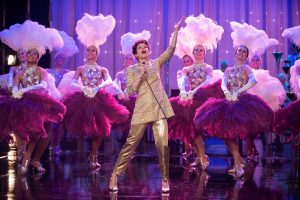 Consummate professional Judy Garland (Renée Zellweger, center) puts on quite a show for audiences at London’s Talk of the Town nightclub in “Judy.” Photo by David Hindley, courtesy of LD Entertainment and Roadside Attractions.[/caption]
Consummate professional Judy Garland (Renée Zellweger, center) puts on quite a show for audiences at London’s Talk of the Town nightclub in “Judy.” Photo by David Hindley, courtesy of LD Entertainment and Roadside Attractions.[/caption]
Judy also knew how to spread compassion, care and loving tolerance to others. This is obvious, for example, in her love for her children. But it was also apparent in the kindness she showed to others, like Dan and Stan, outsiders who often suffered harsh ridicule from mainstream society. Having often been subjected to the cruelty of others, Judy knew what it was like for those who suffered the same kind of treatment from callous, uncaring segments of society. She offered comfort and reassurance that there was nothing wrong with being oneself, no matter how different one might be, a belief she came to realize for herself and that she freely shared with others.
It’s indeed sad that Judy’s circumstances may have ended up being more than she could bear. But, in combatting those conditions, we should never forget that she fought the good fight, and “Judy” celebrates her courageous battle. Her spirit and gumption are indeed inspiring, qualities guaranteed to move viewers, especially in the film’s concluding sequence. It’s through those images that we should remember what gifts she gave us, having made the world a better place for her presence in it, one adorned by happy thoughts and resplendent rainbows.
[caption id="attachment_11021" align="aligncenter" width="300"]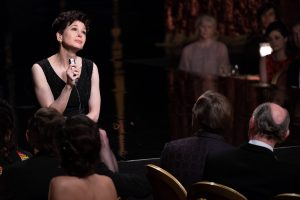 Crooning her signature melody “Over the Rainbow,” singer Judy Garland (Renée Zellweger, center) brings down the house in a touching moment in the moving new biopic, “Judy.” Photo by David Hindley, courtesy of LD Entertainment and Roadside Attractions.[/caption]
Crooning her signature melody “Over the Rainbow,” singer Judy Garland (Renée Zellweger, center) brings down the house in a touching moment in the moving new biopic, “Judy.” Photo by David Hindley, courtesy of LD Entertainment and Roadside Attractions.[/caption]
Doing justice to an iconic performer can be a tricky proposition, but “Judy” does just that where the legendary singer-dancer-actress is concerned. Renée Zellweger in a comeback performance of her own absolutely knocks it out of the park in a touching, brings-tears-to-your-eyes portrayal of the talented but tragic performer. While some elements might have been handled a little better (such as the pacing in the first 30 minutes), the film more than makes up for any minor shortcomings with Zellweger’s phenomenal singing and acting, capturing Judy’s sensitive but sad essence with heartfelt emotion and a superb rendition of her subject’s character. This may not be a perfect movie, but it’s one that absolutely gets it right where it counts.
The fondness we hold for certain entertainers never seems to fade. That’s especially true when they leave us too soon. There’s a certain unfairness associated with that, one that we have difficulty accepting. But, thankfully, we always have the artistry they leave behind. Judy Garland was one of those iconic performers, and her works have lived on long after she left us. And, through this film, she lives again, allowing us to relive the hope of a place where the dreams that you dare to dream really do come true.
Copyright © 2019, by Brent Marchant. All rights reserved.
